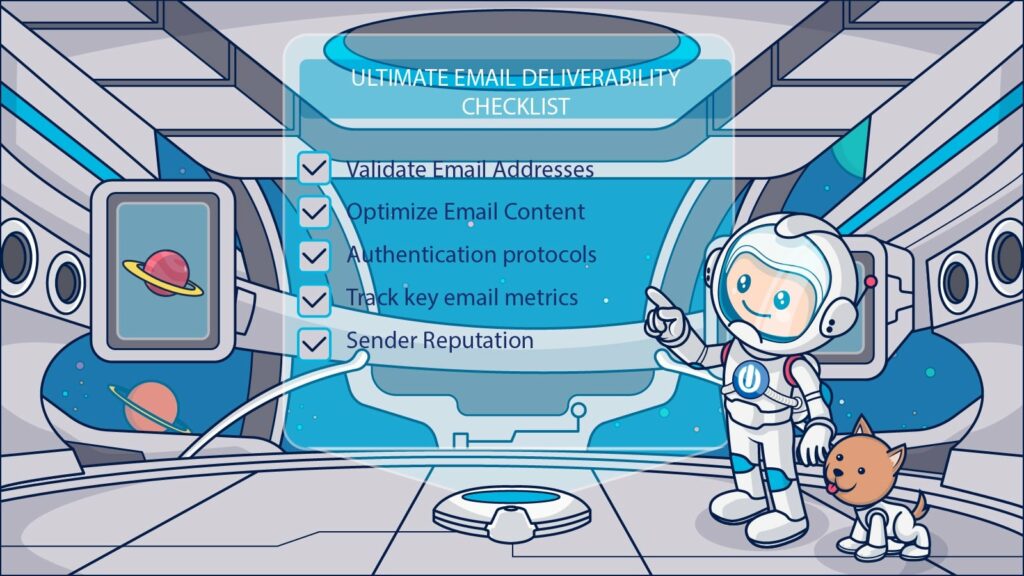Cleaning your list is one of the most important things you can do as an email marketer. Conducting proper email hygiene protects you from all kinds of spam traps, ensuring a pristine sender reputation. There are many ways to go about it, and so we gathered tips from top experts in the email industry.
Email experts share email list cleaning tips
Ask and you shall receive
CEO of Revue, Martijn de Kuijper advises email pros to “Keep asking for feedback, so that you’ll know what to improve, what people are reading. This way you keep sending what people want to read, but you also keep them engaged. Most people don’t even know that they can reply to newsletters, so it’s always good to remind them.”

Knowledge is power
Wendy Burt-Thomas suggests “Find out why they’re inactive. When you give your contacts a way to unsubscribe after a long period of inactivity, give them a one-click survey on your unsubscribe page to find out why they’re leaving. Too many emails? Irrelevant content? Not enough discounts? Use the information to keep the next contact from leaving. You can also include a similar survey on your unsubscribe confirmation page.”
Source: http://www.verticalresponse.com/blog/15-hygiene-tips-to-keep-your-email-list-clean-as-a-whistle/

SEGengageMENT
Kelly Chase, a Digital Strategist at The Content Factory, practices the combination of segmentation by engagement. She says, “Use tags to track, not just who is opening your emails, but who is actually clicking through the links that you send. An open is great, but a subscriber who
opens the email and then clicks through to whatever deal or content you are trying to share with them is a subscriber who is engaged and interested in what you are offering.
This also allows you to see who isn’t engaging with your content. Over time if users consistently aren’t showing interest in your content you can send them an email asking them if they’d still like to be on the list or even send them a special offer to try to entice them back. It’s up to each individual business to decide how to handle that, but if you segment your list by engagement from the beginning you’ll be better able to manage the cleanup whatever you decide.”

Let go of the lurkers
Kevin Gao, CEO & Founder of Comm100, warns that you should “try to identify individuals who may be looking at your email but not registering as an opened email because they don’t load images or use only the preview pane. Generate a group email to everybody on your low-usage list letting them know that you’re doing periodic email maintenance. You’ve noticed that while they still receive your emails, they haven’t opened one in quite some time. You may be going to their spam box or folder, or they may no longer be interested in receiving your regular emails. If they are interested, provide them with an email address or a simple confirmation box or link to check and return them to the main list. If they do not respond, then keep them on your secondary list and only email them during important revenue or traffic times.”

One last chance
Heather Bonura. the Director of Brand Strategy for email marketing firm, Listrak, advises “Before you remove subscribers, try a re-engagement campaign to regain their interest. You might offer a special incentive to recapture their attention. If that doesn’t work, simply ask them if they wish to remain on your list and include an easy way for them to opt out, or send a notification that their subscription period is ending and ask them to opt-in again. If the subscriber remains inactive, remove them from your list. Remember: the success of an email marketing campaign should not measured by the number of subscribers. Rather, it should be measured by the quality of the subscribers and the actions they take as a result of your email (like downloading your ebook and converting into a lead!). Therefore, it’s better to deploy campaigns to 20,000 active and engaged people than it is to blast the email to 30,000 people if half of them don’t care, delete it, or worse — report it as spam.”
Source: http://blog.hubspot.com/blog/tabid/6307/bid/26404/4-Tips-to-Keep-Your-Email-List-Squeaky-Clean.aspx

Dedup and standardize
Cori Pearce, Demand Generation Manager at WealthEngine offers these great tips:
- Standardizing fields as they come into your database will ensure
- consistency among records allowing for accurate queries and segmentation
(i.e. mode for easier cleanup). - Another cleanup effort that can make a big difference is to clean
up duplicate records. If duplicates are in your list, it’s hard to get a
clear picture of your audience size. Having surplus records for the same
person also makes it impossible to have a comprehensive activity history.

Real people only
Carly Brantz, Senior Director of Revenue Marketing at SendGrid, reminds marketers to “Only mail to actual people. That means automatically remove abuse@; support@; info@, etc. email addresses. More than likely these emails have not opted into your list so it’s best to get them off your list fast.”
Source: https://sendgrid.com/blog/email-list-hygiene-5-tips/

Spring (and Fall) Cleaning
Jeff Kline, Founder and CEO of Accrisoft Corporation proposes a deep cleaning of email lists, “Schedule a list cleaning every six months or so, and perform the following tasks:
- Correct misspellings.
- Double-check unsubscribe requests and make sure they have all been honored.
- Check your email analytics, and remove any addresses with zero opens in the last six months.
- Remove fake email addresses.
- Look at your bounce list, and remove all addresses with hard bounces (usually non-existent email addresses or domains).
Make those Golden Lists sparkle!”

Contact your contacts
Dexter Siglin, Vice President, Marketing and Business Development at netnetweb.com says that marketers should adopt this trick: “Frequent communication with your audience: If you are not regularly communicating with your contacts, then you will no doubt experience high ‘hard bounce’ rates. One of the best ways to ensure you have solid contacts – is to contact them!”

More will get you less
Naomi Dunford, owner of IttyBiz, has an interesting idea. She says, “Deliver more content than usual (for you) over a specific period of time. . . One way to accomplish this is to run a series of informational emails, since that’s a valid enough excuse to mail more frequently. If you’re normally publishing once a week, you could run a 5-part series on the topic of your choice, and maybe mail twice a week or once every three days.
You’ll get a good number of unsubscribes that way from people who don’t want to be on your list, and you’ll probably make the people who do like you like you a little bit more, since they’re getting more from you than they’re used to.”
Source: http://ittybiz.com/clean-up-your-email-list/

Use the pros
Douglas Karr, an established leader in the marketing technology space, suggests using email verification and list hygiene providers. He says “Utilization of these list hygiene services can improve the percentage of emails that make it to the inbox, reduce your risk of being blocked by the Internet Service Providers, and reduce the risk of getting fired by your Email Service Provider… they’re worth the investment if you’ve got an old list or are collaborating on one. Keep in mind that you’ll simply never reach 100% accuracy on your lists. People change jobs and providers often, abandoning their old email addresses.
Most of these providers also offer an API so that you can integrate it into your acquisition process.”

Segment for relevancy
Eric Brantner, founder of Scribblrs.com says that “The first thing you need to do is segment your list. This will create the best chances that list subscribers will only receive emails that are relevant to them. What is segmentation? Basically you’re cutting up your email list based on the data you have on each person.”

Bounce off
Mike Gingerich, President of web firm Digital Hill and Co-Founder of TabSite urges businesses to manage bounces, “The best practice for determining which addresses are bad is to set a threshold for the number of bounces each email address registers. You shouldn’t remove an address after just one bounce. The user might have been away on vacation, and his email filled up, or maybe his server was experiencing technical difficulties. A good threshold number for bounces is three to five. Beyond that many bounces to one address, it’s best to clean your list of that address to maintain a good email reputation.”
Source: https://www.mikegingerich.com/blog/5-tips-for-improving-your-email-marketing-strategy/















